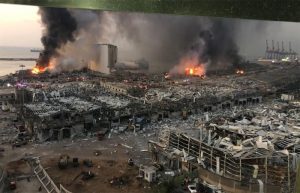France’s moves in the region have hastened significantly in recent years. To preserve its position as an influential actor in the region, not only did it provide various types of support for Haftar’s forces in Libya, but it also showed remarkable presence in the Lebanese file, where it was one of the first countries that rushed to visit Beirut after the explosion that destroyed the city’s port in early August 2020. These acts are attempts to impose political and economic agendas that are seen as part of its efforts to employ the region’s files in order to revitalise its declining role in the Middle East, especially in the Eastern Mediterranean.
Here is an assessment of the situation examining France’s motives driving these efforts, the dimensions of these endeavours, and their outcomes at the level of France’s presence in the region and the security of the region as a whole.
Dimensions of France’s endeavours in the region
To understand the dimensions of France’s endeavours in the region, it is necessary to look at the nature of its presence in the region historically. France is one of the countries involved in the creation of the countries currently in place since the fall of the Ottoman Empire, through the Sykes-Picot Agreement. Its long colonial presence in the region enabled it to build political / economic alliances that facilitated the exploitation of wealth of the countries it controlled.
Its role in the region has declined in recent years for several reasons. Among them is the growing role of the US after the end of the colonial era; another being the adoption of an isolationist policy by some French presidents, such as Jacques Chirac; and another is related to the nature of the accelerating challenges that the region witnessed as a result of the increase in political and security tensions that exist due to the interconnection of many competing projects.
What helps in understanding the dimensions of France’s current existence is to look at the nature of the alliances that shape the landscape of the region as a whole, in addition to understanding the strengths and weaknesses that govern its movements in the region. In general, the Western role – in recent decades – in the region witnessed a significant decline, especially after the Arab Spring. The truth of most slogans that have always called for democracy that were used to put people to sleep were exposed after the attempts to unbind from the yoke of tyranny were aborted across the region. The decline of the Western role was accompanied by the emergence of competing projects such as the Turkish, Iranian and Russian projects.
Faced with these challenges, France relies on its strategic and tactical relations in its moves in the region. In terms of its strategic relations with Western powers, it is trying to regain its presence in the region to preserve the influence of these forces. This is particularly so given Britain’s preoccupation with dealing with its domestic affairs following Brexit, and the preoccupation of the US in its upcoming elections. In this predicament, we see these forces turning a blind eye to the hastened moves by France in the region. An example of this is the US’s disregard for France’s recent moves in Lebanon and its alliance with Hezbollah – the Iranian arm in the region – despite the economic sanctions imposed on it.
Meanwhile, France relies in its moves on its tactical alliances – such as its alliance with the UAE and Egypt – in order to employ the region’s files to achieve goals through which it seeks to restore its presence.
France’s moves are characterised by a number of strengths, as summarised below:
– France is distinguished by having a permanent seat in the Security Council, and it has high military capabilities. Due to the decline of its role in recent decades, it is trying to regain its place, taking advantage of aspects that may enhance its presence in the region, especially in the issue of the Eastern Mediterranean conflict.
– France’s presence in the region has wide influence. Despite the end of the colonial era historically, the independence that the colonial countries won was but a formal independence, and French influence is still widespread, especially in the West African region. This explains its desperate support for Haftar’s forces, despite the contradiction it represents for its democratic symbolism. Indeed, it fears a real change in the political system in Libya, which would threaten its influence in Africa.
– France has a high capacity for manoeuvre by virtue of its pragmatic policy in the Arab region, and by virtue of the multiplicity of files through which it operates. For example, it refrained – unlike many European countries – from classifying Hezbollah as a terrorist movement, and thus it is still able to influence various parties in Lebanon, and it can attain its goals and policies by exploiting the existing unrest.
– Although France enjoys a wide network of relations and influence, it is not able to influence Europe’s opinion in criminalising Turkey’s moves in the various files of the region, whether in northern Syria or in the Eastern Mediterranean. Whilst international parties’ reactions to Turkey’s moves vary, most of them prefer to remain neutral.
– France views itself as most qualified in acting on a wide range of issues in the region given its historical and cultural connection with these countries since the colonial era. However, it is no secret that this historical interconnectedness has a negative connotation associated with the colonial legacy that practiced various violations against the indigenous population, including seeking to dissolve the identities of these populations by force whilst under their control.
– Recent successive French moves display characteristics of being more reactionary in nature. Despite the decline of France’s role in the region in recent decades, as well as the emergence of widespread new projects, France did not move firmly until Turkey made progress on various fronts. This is particularly so in the Libyan file, which enabled it to finally move freely in the Eastern Mediterranean following an agreement it signed with the reconciliation government.
– Despite its reliance on its cultural reputation as a democratic state, as well as the shiny slogans it carried in its recent endeavours in Lebanon, it does not seem that France actually holds any real projects in the region. In the Libyan file, it contradicts itself by supporting the head of despotism (Haftar); and in the Lebanese file, its role is limited to criticism and coordination, as its economic situation does not allow it to pull Lebanon out of its economic predicament. Moreover, the solutions which Macron presents cannot extricate Lebanon from its political crisis as it does not digress from the old structure that is based on the ‘Muhasasa’ system, which has already proven its failure.
Meanwhile, France faces a number of challenges related to its limitations:
The motives of France’s endeavours in the region
The French position is driven by a set of motives that entwine to form an overall vision that push France to take positions that often seem contradictory to what any democratic country would claim. This vision can be understood by focusing on three main motives that drive French endeavours in the region.
1. On the political front: Macron seeks to accomplish achievements at a level of foreign policy to strengthen France’s international influence in a way that distracts or conceals the domestic problems France has been facing recently. This is particularly so following the spread of Covid-19 and the economic downturn that began before the outbreak of the pandemic. The region, with its various files – especially the Lebanese issue – is the best arena for the active endeavours of French foreign policy in a way that can be executed.
2. On the economic front: For long decades, France secured itself economically by controlling its old colonies. Due to its declining role in the region, as well as the growing roles of competitors, France is trying to throw its weight using the various potential files – in Syria, Lebanon and Libya. This is to stabilise a location for itself in the Eastern Mediterranean, especially after it was revealed that the amount of gas available in the Eastern Mediterranean is equivalent to France’s consumption of natural gas for about 50 years. France would then seek to work to secure the process of gas discovery and production activities driven by the protection of its economic interests, both related to securing its gas needs and from reducing European dependence on Russian gas, or by preserving the interests of its exploration companies. Perhaps the recent growth of Turkey’s role is the most prominent threat that France is trying to confront, whether by directly objecting to this role and accusing it of threatening the security and stability of the region, or by trying to mobilise the European position against it or by participating in military endeavours.
3. The security motive is inseparable from the economic motive, as European countries have always considered the Middle East region their own reserves, to supply them with oil or to dispose the consumer products they export. This role declined in recent years, especially after the Arab revolutions, which were followed by the formation of counterrevolutions through which influential countries – including France – sought to contain the scene in a way that serves their interests. This is evidenced by their adoption of a military approach in Africa, especially in the Libyan file, as the continuing chaos in Libya and the expansion of the influence of militias are seen to affect the security of neighbouring countries in Europe, including France. This justifies the latter to support the forces of tyranny in order to protect its interests and those of the West.
4. Restoring its active role in the region: In the security context, France is also trying to restore its leadership of the Mediterranean, as it considers that it is qualified for this leadership given that it is the negotiating country with a permanent seat in the Security Council, as well as its military capabilities. It tries to benefit from the current turmoil for the sake of fixing its position in the Mediterranean region, which is currently considered a vital area for restoring influence and balancing power. The region is an arena for international and regional competition. There are a number of indicators for this, including: the US proliferation through exploration companies or through the Sixth Fleet; the growing Russian influence through Syria or through expansion in the Black Sea; China’s efforts to enter in the equation given the importance of the Mediterranean in Beijing’s strategy and its need to secure the main roads in implementing the Silk Road project; as well as Turkey’s growing endeavours in the region.
The fate of France’s endeavours in the region
The outcome of France’s endeavours must be read on two levels – a domestic level and an international level. At the domestic level, it doesn’t seem that Macron has managed to overcome his political crisis, as the voice of his opponents’ criticism rose more after his intervention in Lebanon, with these voices considering Macron’s interventions as an attempt to restore the colonial tutelage, which harms France more than it serves it. On an international level, it seems that the approach taken by France will not bear fruit, in the short term at least, as its alignment with the forces of tyranny in Libya, its unjustified criticism of Turkey’s role in the Eastern Mediterranean, and the colonial spirit that it uses in dealing with the Lebanese file, all confirm the fact that Its successive movements do not seek to achieve stability in the region. On the contrary, they are complicating the scene, devoiding just demands from any content, and employing them only for the sake of their colonial goals, especially with regard to their ambitions in the Eastern Mediterranean.
In general, it doesn’t seem that France’s recent moves will contribute significantly to enabling France to restore its old role in the region for several objective reasons. One of these reasons is that the conflicts produced by Sykes-Picot are capable of fragmentation and proliferation, and thus complicate the scene more than the French appetite can bear. The other reason is related to the changes in the global front as a whole, such as a decline in the US role and the emergence of other forces outside the Western system, which mean that conditions will differ radically in the covenants and agreements used in the region. Furthermore, existing differences may contribute to changes in the security system, NATO, upon which France relies, and it would then be difficult for it to deal with the new challenges with its old colonial self.
Conclusion
The Arab region is still afflicted by the domestic conflicts that devastate it. This makes it vulnerable to junctures and entwining interests in a way that prevent its stability in the short and long term. Indeed, France’s desperate attempts to support the forces of tyranny in Libya or dictating its political orders in Lebanon is evidence of that. This situation cannot be overcome by relying on the methodology of de-facto recognition. Rather, the causes that led to this situation must be addressed, at the forefront of which are the causes of tyranny after the end of colonialism.







